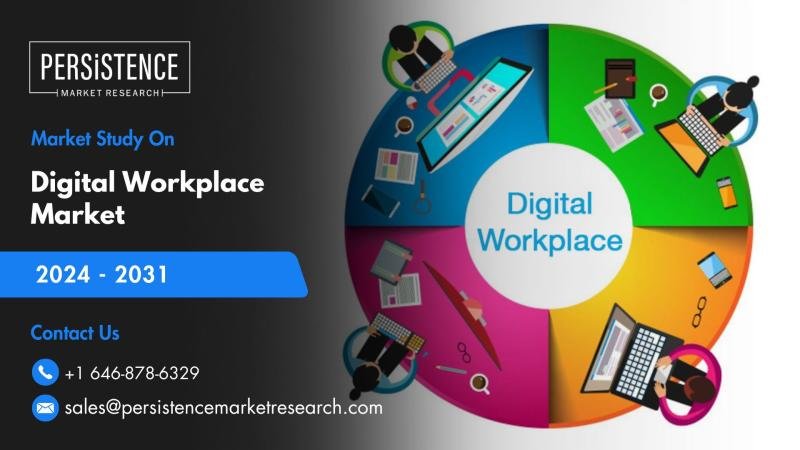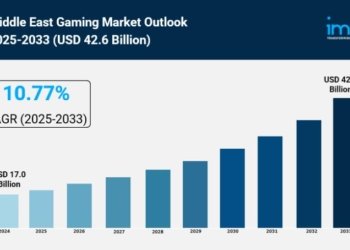✅Market Booming with 20.7% CAGR Amid Rising Demand for Remote Collaboration and Digital Transformation
According to the latest research from Persistence Market Research, the global digital workplace market was valued at US$26.4 Bn in 2024 and is projected to grow rapidly to US$135.1 Bn by 2031, expanding at an impressive CAGR of 20.7% during the forecast period. The market’s strong growth trajectory is driven by accelerated digital transformation across industries, the widespread adoption of cloud computing, and a growing emphasis on hybrid and remote work environments. The digital workplace has emerged as a cornerstone of the modern enterprise, integrating communication, collaboration, and productivity tools into a unified digital ecosystem.
As organizations increasingly embrace flexible work models, digital workplace platforms are becoming indispensable in enhancing employee engagement, collaboration, and operational efficiency. The key growth drivers include the rise of AI-powered tools, demand for seamless user experiences, and the need to reduce operational costs while enhancing productivity. The cloud deployment segment holds the largest market share owing to its scalability, cost-efficiency, and ease of access. Regionally, North America dominates the digital workplace market, supported by the presence of major tech players, robust IT infrastructure, and a culture of early technology adoption. However, Asia Pacific is poised for the fastest growth due to increasing digitization efforts across countries like India, China, and Singapore.
Get a Sample PDF Brochure of the Report (Use Corporate Email ID for a Quick Response): https://www.persistencemarketresearch.com/samples/34627
✅Key Market Insights
➤ Cloud-based digital workplace solutions dominate the market due to cost savings and operational agility.
➤ North America leads the global market with early adoption and technological maturity.
➤ Collaboration tools and communication platforms form the backbone of digital workplace solutions.
➤ SMEs are increasingly investing in digital workplace platforms to streamline workflows and compete with larger enterprises.
➤ Integration of AI, machine learning, and automation enhances personalized employee experiences.
✅Why is the digital workplace important for business success?
A digital workplace is essential for business success because it centralizes communication, enhances collaboration, and streamlines workflows across distributed teams. By offering real-time access to data and tools, it empowers employees to work more flexibly and efficiently, leading to increased productivity and engagement. Furthermore, digital workplaces support innovation, reduce operational costs, and improve agility in response to market changes. In today’s hybrid work environment, they are critical for retaining talent and sustaining business continuity. As a result, companies that embrace digital workplace solutions often outperform those relying on traditional models.
✅Market Dynamics
Market Drivers:
The key factors propelling the digital workplace market include the rising demand for flexible work environments, the surge in mobile device usage, and the increasing adoption of cloud services. Additionally, businesses are focusing on employee experience, agility, and resilience in the face of global disruptions. Integration of next-gen technologies such as AI, machine learning, and analytics further contributes to the market’s acceleration by enabling intelligent and personalized workflows.
Market Restraining Factor:
Despite its benefits, digital workplace adoption faces hurdles such as data security concerns, lack of technical expertise, and resistance to change among traditional enterprises. Small and medium businesses, in particular, may find it challenging to afford the upfront investment required for comprehensive digital transformation.
Key Market Opportunity:
An emerging opportunity lies in the integration of unified endpoint management (UEM) and zero-trust security models into digital workplace platforms. As remote work continues, solutions that prioritize seamless access while ensuring data security will become increasingly valuable, offering vendors a strategic edge.
✅Market Segmentation
The digital workplace market can be segmented by component, organization size, deployment model, end-use industry, and region. Based on component, the market includes solutions (such as unified communication, collaboration tools, and content management systems) and services (including consulting, support, and implementation). Solutions dominate due to increasing reliance on collaborative tools to maintain productivity in decentralized workforces.
By organization size, the market is split into large enterprises and small & medium enterprises (SMEs). While large enterprises have historically driven adoption, SMEs are now significantly contributing to growth due to cost-effective cloud-based solutions. In terms of deployment, cloud-based models lead over on-premise solutions, offering scalability, accessibility, and simplified IT management. By end-user, IT & telecom, BFSI, healthcare, retail, and education are major adopters, with BFSI and IT sectors leading due to high digital dependency and remote service models.
✅Regional Insights
North America leads the global digital workplace market owing to robust digital infrastructure, high penetration of cloud computing, and the presence of top-tier software vendors. The U.S., in particular, has witnessed rapid digital workplace adoption driven by the need for enterprise mobility and business continuity solutions.
Europe follows closely, supported by government-led digitalization programs and widespread remote working trends post-COVID. Meanwhile, Asia Pacific is the fastest-growing region, fueled by booming tech investments, a growing startup ecosystem, and rising demand for digital solutions in developing economies like India and China. Latin America and the Middle East & Africa are also showing growing interest in digital workplace strategies, especially in the finance and education sectors.
✅Competitive Landscape
The digital workplace market is competitive and includes both global giants and emerging players offering niche solutions. Vendors are focusing on AI integration, partnerships, and expanding their service portfolios to stay ahead in the rapidly evolving landscape.
✅Company Insights
✦ Microsoft Corporation
✦ IBM Corporation
✦ Google LLC
✦ Cisco Systems, Inc.
✦ Citrix Systems, Inc.
✦ Atos SE
✦ Unisys Corporation
✦ Tata Consultancy Services (TCS)
✦ VMware, Inc.
✦ NTT Data Corporation
✦ Zoho Corporation
✦ Infosys Limited
For Customized Insights on Segments, Regions, or Competitors, Request Personalized Purchase Options @ https://www.persistencemarketresearch.com/request-customization/34627
✅Key Industry Developments
In 2023, Microsoft announced expanded integration of its Teams platform with generative AI tools from Azure OpenAI to automate meeting summaries, improve collaboration, and enhance employee experiences. This marked a significant step toward intelligent digital workplaces. Similarly, Google introduced new AI-driven enhancements in Google Workspace, focusing on smart suggestions, real-time transcription, and workflow automation.
Atos SE and Unisys Corporation have been collaborating with enterprise clients to develop tailored digital workplace transformation strategies, especially for industries undergoing rapid digital shifts such as healthcare and education. Meanwhile, Citrix has been enhancing its virtual workspace offerings to address hybrid work complexities, offering secure, consistent user experiences across multiple devices and locations.
✅Innovation and Future Trends
As the digital workplace continues to evolve, AI and automation are at the forefront of innovation. Future platforms will offer hyper-personalized employee experiences, enabling proactive task management, intelligent recommendations, and voice-activated collaboration. Augmented Reality (AR) and Virtual Reality (VR) are also entering the digital workplace, especially for training, remote collaboration, and immersive meetings.
Another key trend shaping the future is the integration of employee experience platforms (EXP) into digital workplace suites. These platforms combine communication, wellness, learning, and engagement tools in a unified interface, placing employee satisfaction at the center of digital transformation. Additionally, low-code/no-code tools are becoming vital for customizing workflows and accelerating adoption without deep IT involvement, democratizing the digital workplace for organizations of all sizes.
✅Explore the Latest Trending “Exclusive Article” @
• https://medium.com/@apnewsmedia/buy-now-pay-later-market-key-players-and-competitive-landscape-692fa630b398
• https://techxpresstoday.wordpress.com/2025/06/13/buy-now-pay-later-market-analysis-by-region-and-segment/
• https://webrankmedia.blogspot.com/2025/06/buy-now-pay-later-market-demand-driving.html
• https://www.manchesterprofessionals.co.uk/article/information-technology/94261/buy-now-pay-later-market-overview-with-industry-statistics
• https://vocal.media/stories/buy-now-pay-later-market-adoption-in-retail-and-online-shopping
✅Contact Us:
Persistence Market Research
G04 Golden Mile House, Clayponds Lane
Brentford, London, TW8 0GU UK
USA Phone: +1 646-878-6329
UK Phone: +44 203-837-5656
Email: sales@persistencemarketresearch.com
Web: https://www.persistencemarketresearch.com
✅About Persistence Market Research:
At Persistence Market Research, we specialize in creating research studies that serve as strategic tools for driving business growth. Established as a proprietary firm in 2012, we have evolved into a registered company in England and Wales in 2023 under the name Persistence Research & Consultancy Services Ltd. With a solid foundation, we have completed over 3600 custom and syndicate market research projects, and delivered more than 2700 projects for other leading market research companies’ clients.
Our approach combines traditional market research methods with modern tools to offer comprehensive research solutions. With a decade of experience, we pride ourselves on deriving actionable insights from data to help businesses stay ahead of the competition. Our client base spans multinational corporations, leading consulting firms, investment funds, and government departments. A significant portion of our sales comes from repeat clients, a testament to the value and trust we’ve built over the years.
This release was published on openPR.

















